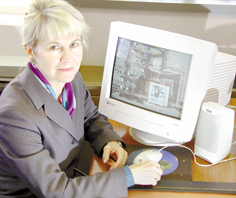|

TECHNOCATION - CEOs can learn smart shopping skills from holiday savers
December 19, 2001
By ELLEN WIGGINS,
Special to the Daily Record

Holiday shoppers seem to be more cautious this holiday season, mainly due to the Sept. 11 attacks and the possibility of a resulting recession. The U.S. Commerce Department released statistics last week showing the biggest drop in retail spending ever for the month of November. A big factor was the end of post-Sept. 11 financing promotions by automakers. American retail stores saw just a two percent up-tick in November sales, missing analysts' predictions by one to one and a half percent. 
Don't let these Grinch-like numbers fool you. Consumers haven't sworn off holiday purchases altogether, they are just seeking better value for their dollar. Retail industry data shows that this year Americans are turning away from traditional department stores and specialty shops such as Macy's and The Gap, and instead are seeking to get more for their money at national discount chains such as Target or Wal-Mart.
As technology business leaders make future plans in uncertain economic times, they could learn a lot from these savvy shoppers by seeking out locations that offer a good deal in one convenient location. Corporate decision-makers contemplating a relocation, consolidation or expansion strategy for the next few years should look no further than their local research university for that kind of value. Business-friendly universities offer more bang for the buck with built-in value from faculty, students and infrastructure plus quality-of-life incentives that few traditional locations can match.
With most state governments offering tax breaks and other financial incentives for businesses to relocate, many traditional locations are starting to look the same. Companies are finding that universities with business parks close to or on campus are some of the best deals around for both their bottom line and for keeping employees happy.
College campuses are a wealth of human capital. Faculty R&D partnerships combined with access to university laboratory or technology equipment help to stretch infrastructure dollars and speed innovation. A steady stream of talented students in fields like computer science, biochemical engineering, Web design, and others, are willing to intern or work part-time for less than market rates in order to get that “real job” experience. Many of them are receptive to full-time offers after graduation.
Another plus of becoming the big company on campus is that the name recognition and high-tech reputation of leading research universities often rubs off on firms looking to better position themselves in the marketplace. Universities also serve as great networking hubs since they frequently host seminars and other functions for professional, research and civic organizations.
Beyond these natural advantages, universities offer attractive lifestyle benefits to employees. College towns are great places to live, with abundant recreation, dining, entertainment, cultural and shopping choices, plus they are already accessible to main transportation hubs. Many companies and their employees also appreciate a university's opportunities for community involvement through established volunteer programs like Habitat for Humanity or Meals on Wheels.
Of course, a college campus' most important function is learning. It's hard to beat the convenience of keeping employees' skills sharp through training and continuing education classes offered across the street instead of across town.
North Carolina's Research Triangle Park (RTP) is one of the best examples of where a cluster of premiere universities make for a great place to live and work. The Raleigh-Durham-Chapel Hill metropolitan area was named “Best Place to Live in the South” by Money magazine in its November 2000 issue. An estimated 45,000 employees work in RTP for 136 organizations, making an average salary of $54,145.
Innovation Park at Penn State University is a good regional example of the added value of a research university as a business location. 35 companies, including telecomm/fiber optics provider Adelphia Business Solutions, take advantage of Innovation Park's proximity to Interstate 99, the University Park Airport, and of course, the resources of one of the country's top research campuses.
Latitude360, the eLearning and eBusiness solutions division of RWD Technologies, has moved its corporate headquarters to the new bwtech@UMBC , a major research and technology park on the campus of UMBC. Latitude360 and the Applied Technology Lab (ATL) are the first tenants to occupy the research and tech park, located in the center of the Baltimore-Washington corridor.
“We are very happy to move to bwtech@UMBC; we're closer to campus now,” said Latitude360 President David Yager, a former distinguished professor and former chair of the Visual Arts Department and director of the Imaging Research Center at UMBC. “The proximity will enhance our interaction with the UMBC community. Our customers, employees and the University will benefit from this relationship.”
As any smart holiday shopper knows, value is about a lot more than price. A good deal in today's real estate market can be found when companies think beyond bricks and mortar. If more CEOs put Maryland's research universities – UMB, College Park, Johns Hopkins and UMBC – on their shopping list, they will find a location that pleases both investors and employees.
|